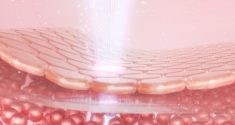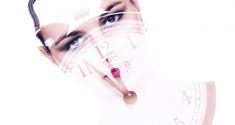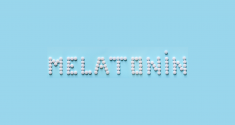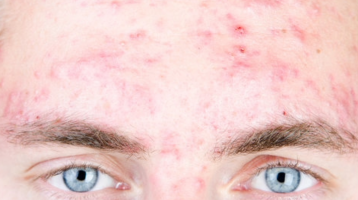With the rise in the use of blue-light-emitting devices, such as mobile phones and tablets, and artificial lighting, such as LED lights, the potential health impact of blue light has been garnering increased attention from researchers. Studies have shown that blue light can impact your melatonin production, sleep quality, circadian rhythm and eye health. Fortunately, awareness is being raised about those potential health issues. However, it’s important to know that new research suggests that blue light damages skin; something that is of concern not merely in terms of appearance, but also – primarily, one could argue – because your skin is your largest organ. Its health matters.
Sleep, the Circadian Rhythm and Eye Health

While blue light exposure during the day is important to circadian rhythm health, blue light exposure in the evening can suppress the production of melatonin. This hormone, among its other important functions in the body, helps you to feel sleepy, easing you into the restful sleep that is so important to overall health and well-being.
Suppressed melatonin production can lead to delayed sleep timing, which can have a negative impact on sleep quality and disrupt the circadian rhythm, all of which can negatively affect physical and mental health in a number of ways. That additional blue light exposure can also impact eye health, increasing the risk of developing digital eye strain, macular degeneration and cataracts.
How Blue Light Damages Skin
Blue light is a type of visible light that is characterized as being high energy and short wave. Those short waves scatter easier, which is why the sky appears blue to our eyes. This type of light, according to recent research, can damage skin over time in a variety of ways.
According to a study done by a team of researchers in Berlin, Germany, and published in Oxidative Medicine and Cellular Longevity, a peer-reviewed journal, blue light exposure produces free radicals, also referred to as unstable atoms, that contribute to oxidative stress, linked to aging and increased risk of several diseases, including cancer, diabetes, heart disease and some neurodegenerative diseases.
That increase of free radicals and the resulting oxidative stress can contribute to DNA damage, as well as damaging collagen and elastin, both of which are essential to skin health and appearance. Research published in the Journal of Investigative Dermatology found that blue light exposure can contribute to premature aging of the skin and to developing hyperpigmentation. There is some indication, according to a study published in the Journal of Cosmetic Dermatology, that while low energy and low exposure to high energy blue light can be beneficial to skin in some circumstances, acting to prevent or reduce the risk of some skin diseases, longer or excessive exposure to high energy blue light can be damaging, including potentially weakening the skin’s ability to function as a barrier; one of its most important tasks.
Be More Mindful of Blue Light Exposure
Blue light exposure isn’t avoidable. In fact, it would damage your health to avoid it altogether. However, excessive exposure and exposure at the wrong time can have a real impact on your health, causing actual damage to eyes and skin while increasing disease risk in a variety of ways. That makes it important to be more mindful of your exposure to blue light. Make sure to get morning natural light exposure daily. Make an effort to get natural light exposure throughout the day and in the late afternoon when the light is fading.

Healthy Choices Can Help Mitigate Damage
We live in a modern world with modern demands, so the odds are that we’re not going to reduce that evening and nighttime blue light exposure as much as we should. Reduce as much as you can and keep working towards that goal, but also make other healthy choices to help mitigate the potential damage.
Eat a healthy diet focused on real, whole foods, including those rich in antioxidants, such as berries, dark, leafy green vegetables, deep orange vegetables, citrus fruits and tomatoes. Eliminate ultra-processed foods. They are unhealthy, contribute to oxidative stress and increase disease risk. Make sure to get enough physical activity every day.







